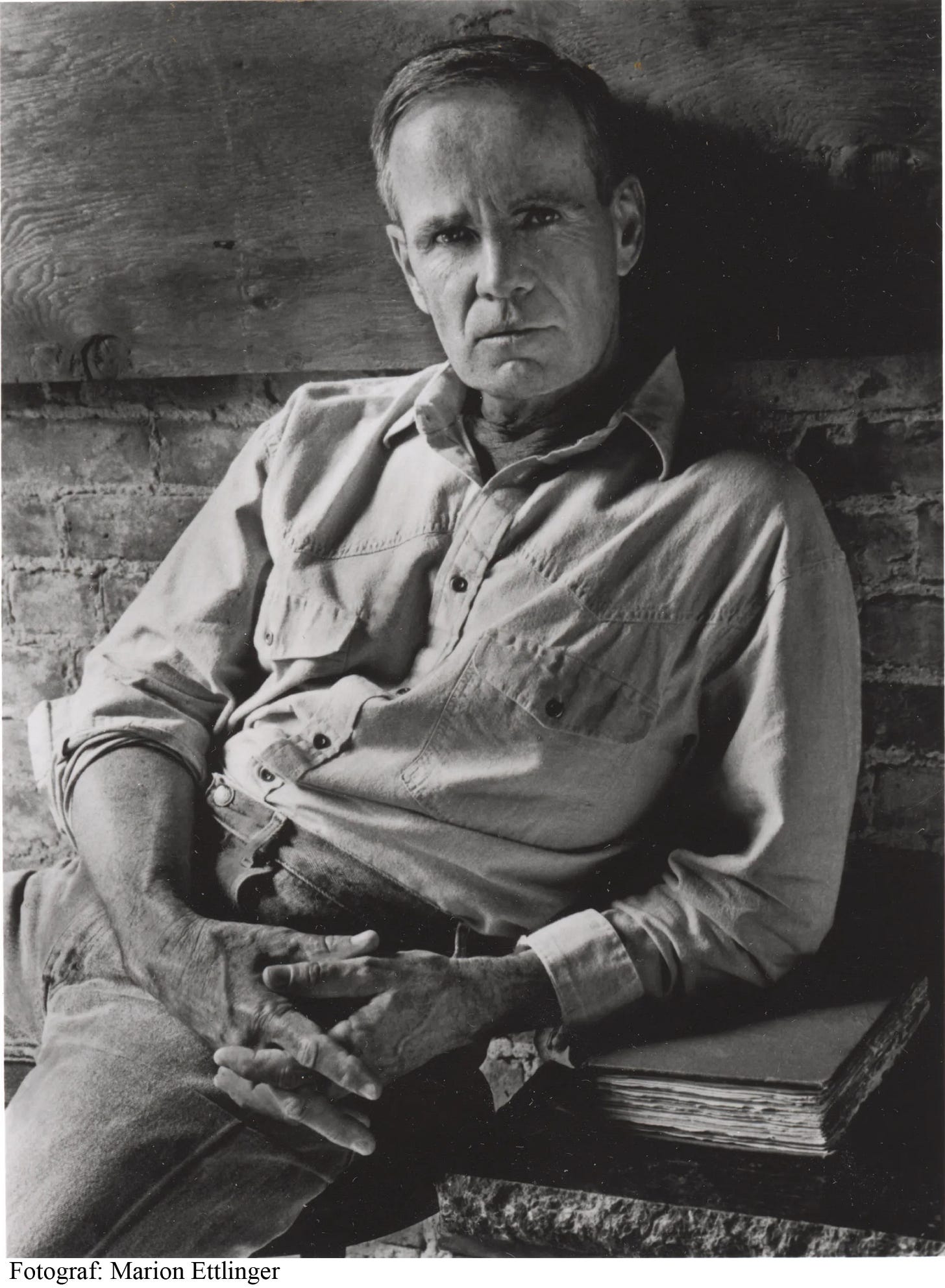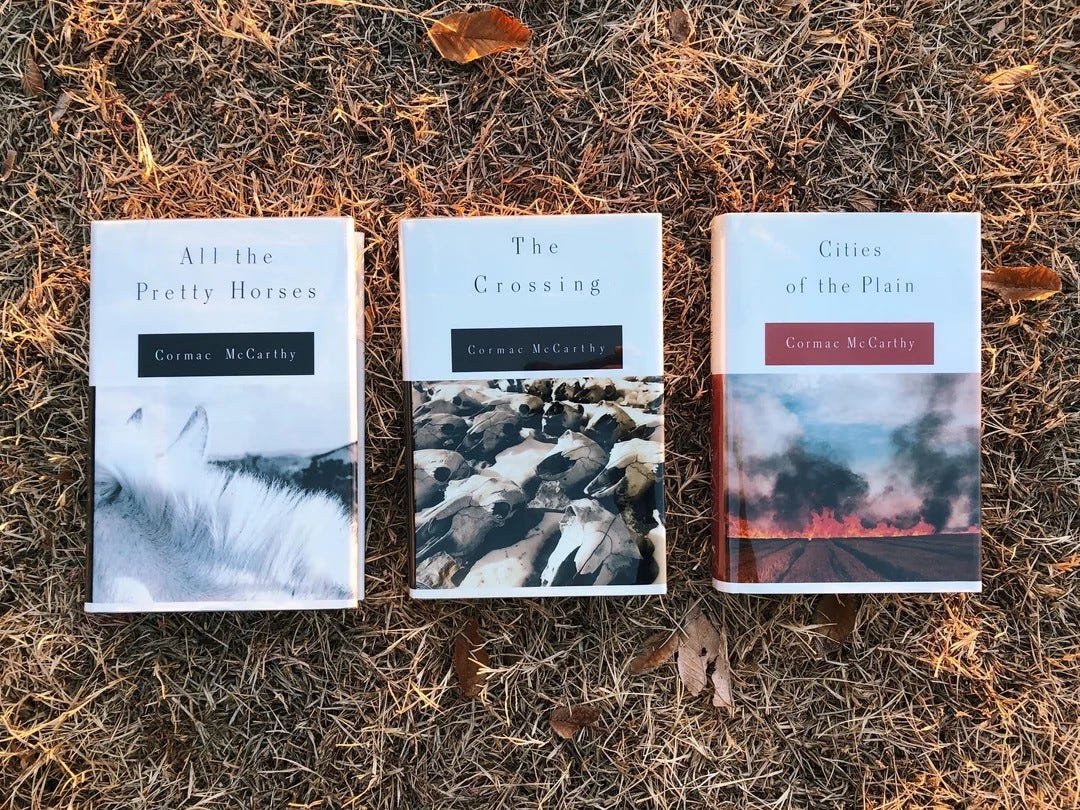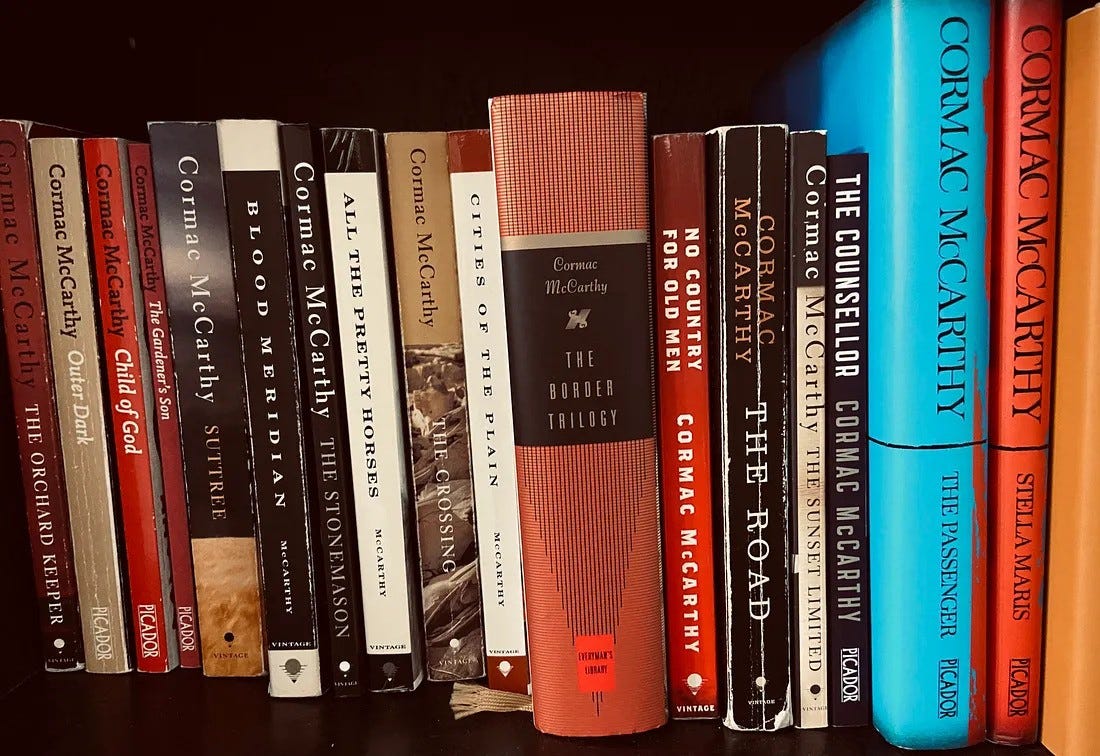Dark Frontiers
The Apocalyptic Landscape of Cormac McCarthy
Exploring Life and Literature
Cormac McCarthy is a towering figure of modern fiction. One of American literature’s most influential and enigmatic voices, his works are characterized by their bleakness, violence, and existential themes, captivating readers and critics alike. From his early novels steeped in the Southern Gothic tradition to his later explorations of the American West, McCarthy consistently pushed the boundaries of literary fiction. His stark prose and philosophical examination of the primal aspects of existence left an indelible mark on me. Today we explore beyond the bookshelf in an attempt to understand this iconic writer and how his thematic choices coalesce to form a unique and powerful literary legacy.
“I like what I do. Some writers have said in print that they hated writing and it was just a chore and a burden. I certainly don’t feel that way about it. Sometimes it’s difficult. You know, you always have this image of the perfect thing which you can never achieve, but which you never stop trying to achieve. But I think…that’s your signpost and your guide. You’ll never get there, but without it you won’t get anywhere.” - Cormac McCarthy
McCarthy was born in 1933 in Providence, Rhode Island, the third of six children. When he was young, the family moved to Knoxville, Tennessee, an area that influenced his early writing. After high school, he enrolled at the University of Tennessee but left after his sophomore year to join the Air Force. During the four years he served, McCarthy cultivated a passion for literature as he read voraciously and began writing short stories. Once discharged, he returned to college in Knoxville, publishing his first stories in the university’s literary magazine. These early works provide a glimpse of what was to come - grim narratives and a Southern backdrop.
In 1965, McCarthy published his first novel, The Orchard Keeper. Set in rural Tennessee, it garnered critical acclaim for its dense, poetic language and complex, morally ambiguous narratives. Over the next two decades, McCarthy published several more works. Categorized as Southern Gothic, the novels Outer Dark (1968), Child of God (1973), and Suttree (1979) explore isolation, violence, and human depravity. His unflinching portrayal of deeply damaged characters exemplifies his willingness to look into the darkest recesses of the human psyche.
McCarthy lived a reclusive life during this period, eschewing the literary scene and public appearances. Known for his intense dedication to his craft and often living in near-poverty while writing, he received several grants and fellowships, allowing him to continue working.
“I think people are the same from the day God first made one.” - Child of God
The publication of Blood Meridian, or the Evening Redness in the West (1985), marked a significant shift in McCarthy’s career. This brutal and haunting story of violence on the American frontier is regarded as his masterpiece. It follows a teenage runaway embroiled in the brutal world of Indian hunting in the mid-19th century. McCarthy’s most iconic character, Judge Holden, is found in these pages. A mysterious and philosophical antagonist, he embodies McCarthy’s exploration of the inherent violence of humanity. This depiction of violence is both stark and lyrical at once, elevating the novel and the writer to mythic levels. While it met with critical acclaim upon release and is hailed as one of the greatest novels of the 20th century, its graphic content and philosophical density make it a challenging read for many. Nonetheless, it solidified his reputation as a writer of immense talent and secured his place in the literary canon.
“War was always here. Before man was, war waited for him. The ultimate trade awaiting its ultimate practitioner.” - Blood Meridian
Following on the heels of Blood Meridian, McCarthy published his Border Trilogy. Comprised of All the Pretty Horses (1992), The Crossing (1994), and Cities of the Plain (1998), it is a monumental work set in the borderlands of the southwestern United States and northern Mexico. The novels weave together the stories of young men on the cusp of adulthood who confront a world as unforgiving as it is beautiful. This trilogy is a masterclass in writing as McCarthy uses landscape, characters, and narrative structure to probe existential questions that stay with readers long after the final page is turned.
The border in these stories functions not only as a physical demarcation between countries but also as a metaphor for the boundaries between cultures and states of being. As the characters cross the literal and figurative border, they find new understandings of themselves and the world around them. Characters find themselves crossing the border in search of an ideal and yet discover that reality is far more complicated and brutal than imagined. The border becomes a landmark between innocence and experience, the old and the new. Here, they confront the limits of their understanding as they are forced to redefine themselves in relation to the world around them. The border is not only a place of physical violence and conflict but also a metaphysical divide between life and death as the characters come to terms with the precariousness of human existence.
“Scars have the strange power to remind us that our past is real.” - All the Pretty Horses
McCarthy's characters in the trilogy discover a tension between fate and free will when they find themselves in situations where their choices seem to be constrained by forces beyond their control. They desire to assert autonomy and shape their own destiny, yet the obstacles and tragedies in their paths cause them to question how much control they have over their lives. Constantly forced to confront the consequences of their actions, these young men must come to terms with their ability to alter their destiny or whether their efforts are futile. McCarthy shows that fate and free will are inevitably intertwined, and individuals often find themselves powerless in the face of more extensive, inexorable forces.
“Deep in each man is the knowledge that something knows of his existence. Something knows, and cannot be fled nor hid from.” - The Crossing
Violence, loss, suffering, and redemption are pervasive throughout these books, reflecting their centrality to the human experience. The novels are filled with brutality, ranging from physical confrontations to the silent harshness of the natural world. Violence is shown as a source of power and a means of asserting control over one’s environment, which is not merely a human construct but a fundamental aspect of existence shaping all living beings.
The characters are driven by a desire to find meaning and purpose in a world marked by impermanence. Throughout the trilogy, they experience the loss of loved ones, innocence, and their way of life. Desperate to preserve what they have known, they experience horrific suffering as they are confronted with the impossibility of holding on to the past and must live with the knowledge that everything they hold dear can be taken away. McCarthy does not shy away from depicting difficult aspects of life, and the trilogy’s tragic ending shows that the world is often indifferent to human suffering.
“Life is brief and to have to spend every day of it doing what somebody else wants you to do is not the way to live it.” - Cormac McCarthy
McCarthy’s later works continued exploring violence and existential dread, with an increasing focus on minimalist prose and sparse dialogue. No Country for Old Men (2005) is a taut thriller examining modern society’s moral decay. The antagonist is a chilling embodiment of fate and death, leaving a trail of destruction in his wake. In 2006, McCarthy published The Road, a bleak, post-apocalyptic novel about a father and son who share a profoundly moving journey through a devastated landscape. It is McCarthy’s most emotionally resonant work, stripping away the violence and brutality of his earlier novels in favor of a meditative exploration of love, survival, and hope. The novel won the Pulitzer Prize for Fiction and was later adapted for film.
Throughout his career, McCarthy’s style has been the subject of much analysis. His prose is characterized by its lack of punctuation and its dense, rhythmic language. He alternates between long, flowing sentences with vivid imagery and stark, abrupt sentences that mirror the harsh realities he depicts. This unique style adds to the mythic quality of his narratives, elevating them beyond mere stories into meditative readings.
His impact on contemporary literature is immense. Exploring violence, morality, and suffering, he redefined the boundaries of American fiction, blending multiple styles into a singular, powerful voice. His influence on other writers can be seen in a generation of writers who imitated his themes and stylistic choices in literature, television, and film. He tackled complex philosophical questions, and through his unflinching exploration of difficult topics, he created a body of work that challenges and provokes.
McCarthy died in June 2023 at his Santa Fe, New Mexico home. While this iconic figure has passed, his works will continue to resonate with readers and critics alike, standing as a testament to the power of literature to explore the deepest questions of human existence.
Want to read more? has written a review of the Border Trilogy, which you should also check out.
And here is a fascinating discussion between McCarthy and his friend David Krakauer.
Finally, if you want to go really deep into Blood Meridian, check out Benjamin McEvoy’s video. Ben’s Hardcore Literature series on YouTube is excellent.
Beyond the Bookshelf is a reader-supported publication. If you have the means and desire, please consider upgrading to a paid subscription.
Until next time…









Thank you for this comprehensive overview, Matthew. I remember when I came across McCarthy's non fiction in a journal (I forget which one), I was very impressed by his style and keen intelligence. However, I find it increasingly hard to read portrayals of violence and I've been put off his fiction by the prospect of coming across too many such scenes. What what you say, perhaps the The Road, for all its bleakness, might be the novel I should try?
I enjoyed this article and appreciated the great quotes in here. Having only recently 'discovered' Cormac McCarthy, I read his masterpiece The Road and loved it. I don't mean to say I enjoyed it, because it was graphic and sometimes hard to read, but it was gripping and intense. And the beauty of the relationship between father and son - that's what stands out for me. This father protecting his son and preparing him for the time he knew he would no longer be with him. Beautiful, hopeful, inspiring. I haven't read anything else by Cormac McCarthy. Can you recommend anything else of his for someone who's a fan of The Road?